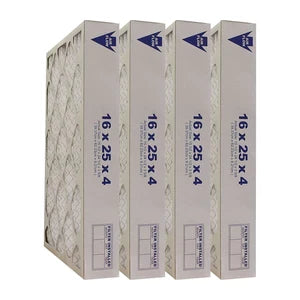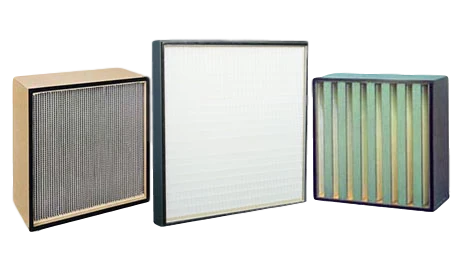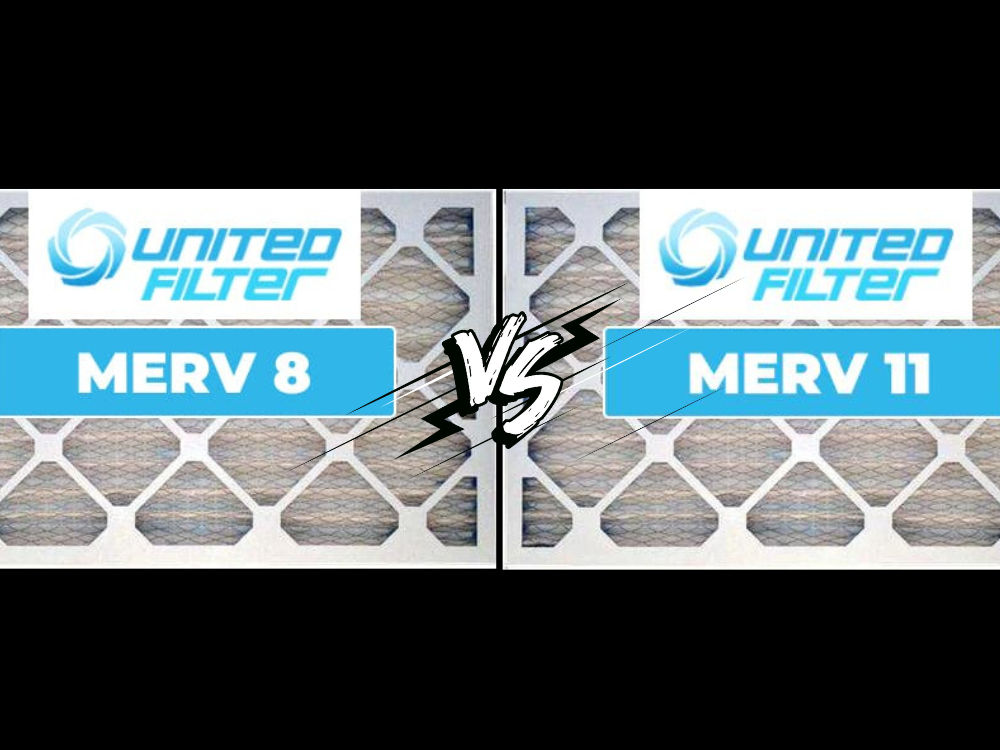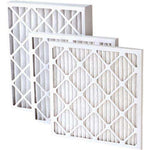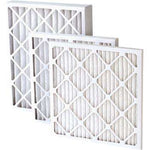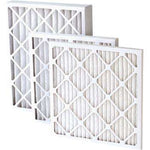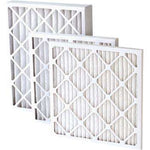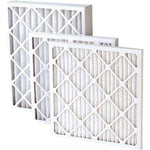Vous avez pas d'articles dans votre panier.
MERV (Minimum Efficiency Reporting Value) is a rating system used to measure the effectiveness of air filters in removing airborne particles from the air passing through them. Higher the MERV rating, the more efficient the filter is at capturing smaller particles.
Here's a comparison between MERV 8 and MERV 11 filters:
MERV 8:
Efficiency: MERV 8 filters are moderately efficient at capturing airborne particles. They can effectively remove particles such as dust mites, pollen, mold spores, and pet dander from the air.
Particle Size: MERV 8 filters can capture particles as small as 3.0 to 10.0 microns in size.
Common Applications: MERV 8 filters are commonly used in residential HVAC systems to improve indoor air quality and protect the HVAC system from dust and debris buildup.

MERV 11:
Efficiency: MERV 11 filters are more efficient than MERV 8 filters and can capture a higher percentage of airborne particles. They are capable of removing smaller particles, including fine dust, bacteria, and some viruses.
Particle Size: MERV 11 filters can capture particles as small as 1.0 to 3.0 microns in size, providing better filtration of smaller particles compared to MERV 8 filters.
Common Applications: MERV 11 filters are often used in residential and commercial settings where higher filtration efficiency is desired, such as homes with pets or allergy sufferers, hospitals, schools, and office buildings.

Which one to use?
The decision of whether to use a MERV 8 or MERV 11 filter depends on several factors, including your indoor air quality needs, HVAC system requirements, and budget considerations.
Here are some points to consider when choosing between the two:
Indoor Air Quality Needs:
If you have specific concerns about indoor air quality, such as allergies to pollen, pet dander, or dust mites, you may benefit from the higher filtration efficiency of a MERV 11 filter. It can capture smaller particles, including fine dust and some bacteria, providing cleaner air.
For general indoor air quality improvement without specific sensitivities or allergies, a MERV 8 filter may suffice. It can effectively capture common airborne particles like dust, pollen, and mold spores.
HVAC System Compatibility:
Check your HVAC system's specifications to ensure compatibility with the selected filter. Some systems may have limitations on the maximum MERV rating that can be used without causing airflow restrictions or other issues.
If your HVAC system is designed to accommodate higher MERV-rated filters and has sufficient airflow capacity, you may consider using a MERV 11 filter for enhanced filtration.
Budget Considerations:
MERV 11 filters generally cost more than MERV 8 filters due to their higher filtration efficiency. Consider your budget and the ongoing cost of filter replacement when making your decision.
While MERV 11 filters offer superior filtration, if budget constraints are a concern, you may opt for MERV 8 filters, which are typically more affordable.
Specific Requirements:
Consider any specific requirements or preferences you have for indoor air quality. If you have pets, allergies, or respiratory issues, investing in a higher MERV-rated filter like MERV 11 may provide greater benefits in terms of cleaner air and improved comfort.
If you are primarily concerned with basic filtration and maintaining the efficiency of your HVAC system, a MERV 8 filter may be suitable for your needs.
Ultimately, the choice between a MERV 8 and MERV 11 filter depends on balancing your indoor air quality priorities, HVAC system compatibility, and budget considerations. If you're unsure, you may consult with a HVAC professional who can provide guidance based on your specific circumstances and needs.
Benefits of MERV 8 Filters:
MERV 8 filters are capable of capturing a wide range of common airborne particles, including dust, pollen, mold spores, pet dander, and larger debris. They provide basic filtration to improve indoor air quality by reducing the presence of these particles in the air.
Compared to higher-rated filters, MERV 8 filters are generally more affordable. They provide an economical option for maintaining clean indoor air and protecting HVAC systems from debris buildup. MERV 8 filters typically have lower pressure drops and airflow resistance compared to higher-rated filters. This means they allow sufficient airflow through the HVAC system while still providing effective filtration.
Benefits of MERV 11 Filters:
MERV 11 filters offer higher filtration efficiency compared to MERV 8 filters. They can capture smaller particles, including fine dust, bacteria, some viruses, and other allergens, providing cleaner air and improved indoor air quality. MERV 11 filters are particularly effective at reducing allergens in the air, making them beneficial for households with allergy sufferers or individuals sensitive to airborne particles like pollen, pet dander, and mold spores.
Commonly used in residential and commercial settings where higher filtration efficiency is desired, such as homes with pets, allergy sufferers, hospitals, schools, and office buildings.
MERV 11 filters may have a longer lifespan compared to lower-rated filters when used in similar conditions. This can result in fewer filter replacements over time, reducing maintenance costs and hassle.
MERV (Minimum Efficiency Reporting Value) is a rating system used to measure the effectiveness of air filters in removing airborne particles from the air passing through them. Higher the MERV rating, the more efficient the filter is at capturing smaller particles.
Here's a comparison between MERV 8 and MERV 11 filters:
MERV 8:
Efficiency: MERV 8 filters are moderately efficient at capturing airborne particles. They can effectively remove particles such as dust mites, pollen, mold spores, and pet dander from the air.
Particle Size: MERV 8 filters can capture particles as small as 3.0 to 10.0 microns in size.
Common Applications: MERV 8 filters are commonly used in residential HVAC systems to improve indoor air quality and protect the HVAC system from dust and debris buildup.

MERV 11:
Efficiency: MERV 11 filters are more efficient than MERV 8 filters and can capture a higher percentage of airborne particles. They are capable of removing smaller particles, including fine dust, bacteria, and some viruses.
Particle Size: MERV 11 filters can capture particles as small as 1.0 to 3.0 microns in size, providing better filtration of smaller particles compared to MERV 8 filters.
Common Applications: MERV 11 filters are often used in residential and commercial settings where higher filtration efficiency is desired, such as homes with pets or allergy sufferers, hospitals, schools, and office buildings.

Which one to use?
The decision of whether to use a MERV 8 or MERV 11 filter depends on several factors, including your indoor air quality needs, HVAC system requirements, and budget considerations.
Here are some points to consider when choosing between the two:
Indoor Air Quality Needs:
If you have specific concerns about indoor air quality, such as allergies to pollen, pet dander, or dust mites, you may benefit from the higher filtration efficiency of a MERV 11 filter. It can capture smaller particles, including fine dust and some bacteria, providing cleaner air.
For general indoor air quality improvement without specific sensitivities or allergies, a MERV 8 filter may suffice. It can effectively capture common airborne particles like dust, pollen, and mold spores.
HVAC System Compatibility:
Check your HVAC system's specifications to ensure compatibility with the selected filter. Some systems may have limitations on the maximum MERV rating that can be used without causing airflow restrictions or other issues.
If your HVAC system is designed to accommodate higher MERV-rated filters and has sufficient airflow capacity, you may consider using a MERV 11 filter for enhanced filtration.
Budget Considerations:
MERV 11 filters generally cost more than MERV 8 filters due to their higher filtration efficiency. Consider your budget and the ongoing cost of filter replacement when making your decision.
While MERV 11 filters offer superior filtration, if budget constraints are a concern, you may opt for MERV 8 filters, which are typically more affordable.
Specific Requirements:
Consider any specific requirements or preferences you have for indoor air quality. If you have pets, allergies, or respiratory issues, investing in a higher MERV-rated filter like MERV 11 may provide greater benefits in terms of cleaner air and improved comfort.
If you are primarily concerned with basic filtration and maintaining the efficiency of your HVAC system, a MERV 8 filter may be suitable for your needs.
Ultimately, the choice between a MERV 8 and MERV 11 filter depends on balancing your indoor air quality priorities, HVAC system compatibility, and budget considerations. If you're unsure, you may consult with a HVAC professional who can provide guidance based on your specific circumstances and needs.
Benefits of MERV 8 Filters:
MERV 8 filters are capable of capturing a wide range of common airborne particles, including dust, pollen, mold spores, pet dander, and larger debris. They provide basic filtration to improve indoor air quality by reducing the presence of these particles in the air.
Compared to higher-rated filters, MERV 8 filters are generally more affordable. They provide an economical option for maintaining clean indoor air and protecting HVAC systems from debris buildup. MERV 8 filters typically have lower pressure drops and airflow resistance compared to higher-rated filters. This means they allow sufficient airflow through the HVAC system while still providing effective filtration.
Benefits of MERV 11 Filters:
MERV 11 filters offer higher filtration efficiency compared to MERV 8 filters. They can capture smaller particles, including fine dust, bacteria, some viruses, and other allergens, providing cleaner air and improved indoor air quality. MERV 11 filters are particularly effective at reducing allergens in the air, making them beneficial for households with allergy sufferers or individuals sensitive to airborne particles like pollen, pet dander, and mold spores.
Commonly used in residential and commercial settings where higher filtration efficiency is desired, such as homes with pets, allergy sufferers, hospitals, schools, and office buildings.
MERV 11 filters may have a longer lifespan compared to lower-rated filters when used in similar conditions. This can result in fewer filter replacements over time, reducing maintenance costs and hassle.
